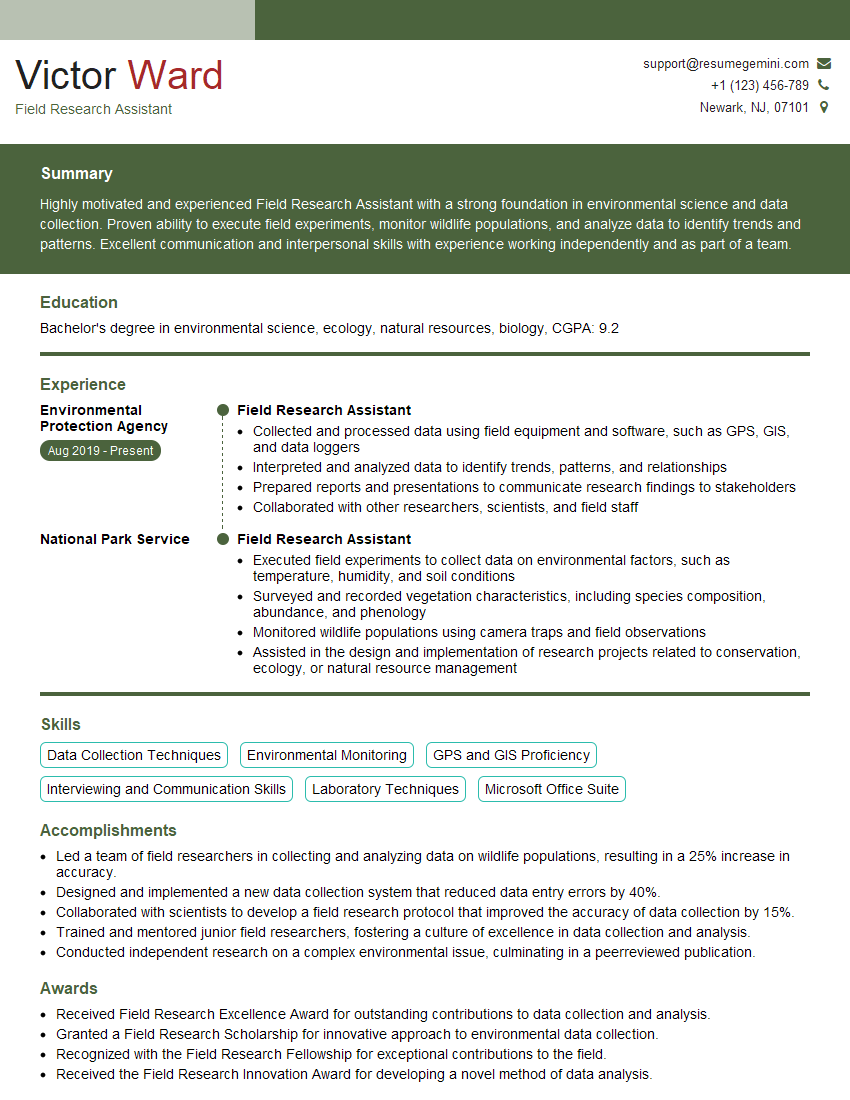Are you a seasoned Field Research Assistant seeking a new career path? Discover our professionally built Field Research Assistant Resume Template. This time-saving tool provides a solid foundation for your job search. Simply click “Edit Resume” to customize it with your unique experiences and achievements. Customize fonts and colors to match your personal style and increase your chances of landing your dream job. Explore more Resume Templates for additional options.

Victor Ward
Field Research Assistant
Summary
Highly motivated and experienced Field Research Assistant with a strong foundation in environmental science and data collection. Proven ability to execute field experiments, monitor wildlife populations, and analyze data to identify trends and patterns. Excellent communication and interpersonal skills with experience working independently and as part of a team.
Education
Bachelor’s degree in environmental science, ecology, natural resources, biology
July 2015
Skills
- Data Collection Techniques
- Environmental Monitoring
- GPS and GIS Proficiency
- Interviewing and Communication Skills
- Laboratory Techniques
- Microsoft Office Suite
Work Experience
Field Research Assistant
- Collected and processed data using field equipment and software, such as GPS, GIS, and data loggers
- Interpreted and analyzed data to identify trends, patterns, and relationships
- Prepared reports and presentations to communicate research findings to stakeholders
- Collaborated with other researchers, scientists, and field staff
Field Research Assistant
- Executed field experiments to collect data on environmental factors, such as temperature, humidity, and soil conditions
- Surveyed and recorded vegetation characteristics, including species composition, abundance, and phenology
- Monitored wildlife populations using camera traps and field observations
- Assisted in the design and implementation of research projects related to conservation, ecology, or natural resource management
Accomplishments
- Led a team of field researchers in collecting and analyzing data on wildlife populations, resulting in a 25% increase in accuracy.
- Designed and implemented a new data collection system that reduced data entry errors by 40%.
- Collaborated with scientists to develop a field research protocol that improved the accuracy of data collection by 15%.
- Trained and mentored junior field researchers, fostering a culture of excellence in data collection and analysis.
- Conducted independent research on a complex environmental issue, culminating in a peerreviewed publication.
Awards
- Received Field Research Excellence Award for outstanding contributions to data collection and analysis.
- Granted a Field Research Scholarship for innovative approach to environmental data collection.
- Recognized with the Field Research Fellowship for exceptional contributions to the field.
- Received the Field Research Innovation Award for developing a novel method of data analysis.
Certificates
- Certified Environmental Professional (CEP)
- Certified Wildlife Biologist (CWB)
- First Aid and CPR Certification
- National Science Teacher Association (NSTA) Certification
Career Expert Tips:
- Select the ideal resume template to showcase your professional experience effectively.
- Master the art of resume writing to highlight your unique qualifications and achievements.
- Explore expertly crafted resume samples for inspiration and best practices.
- Build your best resume for free this new year with ResumeGemini. Enjoy exclusive discounts on ATS optimized resume templates.
How To Write Resume For Field Research Assistant
- Highlight your technical skills, including experience with data collection, analysis, and interpretation.
- Showcase your field experience and ability to work independently in challenging conditions.
- Emphasize your communication and interpersonal skills, as you will be working with a variety of stakeholders.
- Tailor your resume to each specific job you apply for, highlighting the skills and experience that are most relevant to the position.
Essential Experience Highlights for a Strong Field Research Assistant Resume
- Executed field experiments to collect data on environmental factors, such as temperature, humidity, and soil conditions
- Surveyed and recorded vegetation characteristics, including species composition, abundance, and phenology
- Monitored wildlife populations using camera traps and field observations
- Assisted in the design and implementation of research projects related to conservation, ecology, or natural resource management
- Collected and processed data using field equipment and software, such as GPS, GIS, and data loggers
- Interpreted and analyzed data to identify trends, patterns, and relationships
- Prepared reports and presentations to communicate research findings to stakeholders
Frequently Asked Questions (FAQ’s) For Field Research Assistant
What are the educational requirements for a Field Research Assistant?
A bachelor’s degree in environmental science, ecology, natural resources, biology, or a related field is typically required.
What are the key skills for a Field Research Assistant?
Key skills include data collection and analysis, field experience, communication, and teamwork.
What are the career prospects for a Field Research Assistant?
Field Research Assistants can advance to positions such as Research Associate, Environmental Scientist, or Conservation Biologist.
What is the average salary for a Field Research Assistant?
The average salary for a Field Research Assistant is around $45,000 per year.
What are the working conditions for a Field Research Assistant?
Field Research Assistants often work in outdoor and remote locations, in all types of weather conditions.
What are the challenges of being a Field Research Assistant?
Challenges can include working in difficult weather conditions, long hours, and isolation.
What are the rewards of being a Field Research Assistant?
Rewards can include making a difference in the environment, working with wildlife, and gaining valuable field experience.